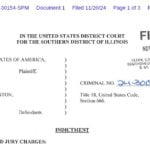DuPage Co. (ECWd) –
What does over $1.5 Million dollars in salary to one person in 9 years get you at the College of DuPage? (7 of those years here)
Dr. Chuck Currier, Vice President of Information Technology is center stage of record destruction practices at the college after our exposing a troubling pattern of e-mail destructions in this article.
During the April 7, 2016 COD Board meeting he took to the podium to answer concerns raised by the Trustees as they have moved forward with a more stringent policy pertaining to record destruction than what the state outlines. His statements may prove to be very problematic during his next performance evaluation, assuming Senior Administrators ever have those at COD.
Dr. Chuck Currier – “The Broader question of Document Retention, Record Retention, So as I understand the law, it leaves it up to the unit of local government to identify their record requirements, so, there is some guidance in terms of using standards for example financial is typically is 7 years. Every unit of local government has the ability to set their own, establish their own records retention policy.” (1:44:50 mark of the video is where Currier speaks to the board)
It is clear, his understanding of the law is completely inconsistent with the law and we will identify why for much less than $1.5 Million dollars. (Insert sarcasm! We understand he does a lot more than just destroy records for his salary)
Directly from the Secretary of State website pertaining to local records, they have a Frequently Asked Question (FAQ) section for people to get a basic understanding of the law. Most would hope a person with a Ph.D. and holding the position of VP of Information Technology and getting paid $200K a year has at least obtained a level of understanding of the law that is higher than an FAQ basic level.
Can I make up my own retention policy or should we hire a consultant?
Only the Local Records Commission and Local Records Commission of Cook County can determine how long your agency must retain records. Under the Illinois Local Records Act, each unit of local government must submit an application that lists the records held by your agency. (Click here for FAQ)
We can clearly see that according to the State Agency in charge of public records, a unit of local government can not make up their own record retention policy. Even us Southern Illinois hayseeds understand that one.
Now let’s look at what the actual law states, which would be lawyer level of understanding. We understand most are not lawyers but please read it anyway and see if you are able to comprehend the law on this matter.
(50 ILCS 205/7) (from Ch. 116, par. 43.107)
Sec. 7. Disposition rules. Except as otherwise provided by law, no public record shall be disposed of by any officer or agency unless the written approval of the appropriate Local Records Commission is first obtained.
The Commission shall issue regulations which shall be binding on all such officers. Such regulations shall establish procedures for compiling and submitting to the Commission lists and schedules of public records proposed for disposal; procedures for the physical destruction or other disposition of such public records; procedures for the management and preservation of electronically generated and maintained records; and standards for the reproduction of such public records by photography, microphotographic processes, or digitized electronic format. ………….
Most lawyers, and even us hayseeds, understand the actuall statute language to read that it is the commission, not the unit of local government, that can establish a records destruction policy.
“The Commission shall issue regulations which shall be binding on all such officers.”
The law appears to be pretty clear regarding record retention and we can only wonder how Dr. Currier came to such an understanding that local government can create their own policy when the law appears to be so clear even we understood it. As Currier continued to share his insight on records retention/destruction at COD some interesting facts were disclosed.
He admits records had been destroyed without permission.
That is a VERY important issue to remember because his response to a question from Trustee Burnstein appeared to be very cryptic and now going back and reviewing the video it raises serious concerns on what has actually been destroyed and when.
Bernstein: Are you aware of any data, could be emails, could be in the form of file records, tables whatever, that we have deleted that have any relevance, significance to any litigation going on at this point?
Currier – We have a duty to retain, we signed documents that say we have a duty to retain, If I knew about it I would say something.
Burnstein – So it has not occurred?
Currier – not as far as I know.
I find Currier’s answers concerning. Note that Trustee Bernstein did not specify what time frame his question pertained to other than to any litigation going on at this time. As we pointed out in this article, there is a laundry list of litigation going on that started months and years ago.
Currier clearly focused his response to record retention documents from a law firm and Board policy but completely avoided answering the question as it would pertain to record destruction prior to those retention/hold documents.
When Burnstein followed up with a question to confirm no such destruction has taken place, Currier confirmed no such destruction took place as far as he knew.
We do KNOW that Currier knows a lot of records were destroyed prior to the retention/hold mandates as he admitted as much when he said records had been destroyed without any permission. He confirms they later asked for permission for those destroyed records and received it.
That is problematic for the State Local Records Commission in our opinion as you can’t give permission to destroy something that is already destroyed. That may constitute forgery depending on how such authority is documented on the certificates of destruction.
The question now is, as it relates to COD, of those records Currier did destroy, was anything done to ensure none of them had any importance to a laundry list of matters such as audits, lawsuits, subpoenas etc. that would have caused a legal retention hold be placed on them? We suspect the answer is no.
It is clear, a lot more questions need answering. We have filed several FOIA requests on this matter and will update when those records are provided.
One thing that is clear, COD has attorneys to give them legal advice. We suggest in the future, COD Senior Administrators refrain from attempting to interpret the law and simply ask legal counsel for an opinion on the subject at hand. It would prevent future embarrassment to the institution that forks out over $1.5 million in salary alone to a person that apparently had no grasp of the law pertaining to record destruction policy all while destroying public records.
Please consider a donation to the Edgar County Watchdogs.
[wp_eStore_donate id=1]








2 Comments
Jon
Posted at 07:34h, 10 AprilIs Chuck Currier covering up for someone? At $200,000 a year salary I think he may be over paid. The school janitor is much smarter than Chuck unless Chuck is covering for someone.
I’ve never seen so many willing to fall on the sword for the person/s involved in the biggest scandal in since Hillary Clinton’s email deletion.
Chuck ought to retract his statements or have pleaded the fifth. The Watchdogs are digging deeper and deeper. Where is the DuPage County States attorney?????? Why hasn’t Dan Cronin
come out in public and demand an investigation?
WOW! These guys forgot we have the best Board Of Trustees the college has ever seen in years.
The reformers are reforming the colleges coruption and culture policies and are proving crime doesn’t pay nor does thinking no one watching. Thank you for watching the tax payers investment.
G. Barraclough
Posted at 18:22h, 09 AprilTrustee Bernstein is a fox. The taxpayers of District 502 are fortunate to have him on the board and on their side.
Chuck Currier may have made the miscalculation of his life mixing it up as he did with Bernstein in their colloquy.
I had a few questions I thought of that could have been asked of Currier as follow-ups. But, it usually is best to leave some for another time. And I suspect Currier may have another chance to answer some of Bernstein’s questions. And, it may not be suitable for all viewers.